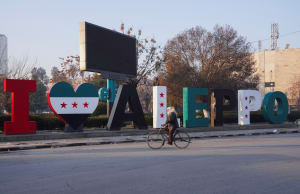What is Bennett’s ‘Octopus Doctrine’ and how does it inform Israel's military approach to Iran?
“We no longer play with the tentacles, with Iran’s proxies: we’ve created a new equation by going for the head,” says Bennett

When Israeli Prime Minister Naftali Bennett announced in late May that Iranian “immunity” is over, he essentially highlighted a shift in the shadow war in which the Jewish state and the ayatollah regime have been locked for decades.
Up until recently, Israeli military strategy has focused on Iran’s terrorist proxies such as Hezbollah, Hamas and other Tehran-backed terrorist militias.
The Iranian terrorist paymasters largely got away.
Now, implementing his “Octopus Doctrine,” Bennett seeks to strike directly at the head of the octopus – the Iranian regime itself.
“We no longer play with the tentacles, with Iran’s proxies: we’ve created a new equation by going for the head,” Bennett said.
Last week, Bennett explained his government’s new strategy in a briefing with the Foreign Affairs and Defense Committee.
“The past year saw a turning point in Israel’s strategy vis-à-vis Iran,” he said. “In the past year, the State of Israel has taken action against the head of the terrorist octopus and not just against the arms as was done in previous decades.
“The days of immunity – in which Iran attacks Israel and spreads terrorism via its regional proxies but remains unscathed – are over. We are taking action, everywhere, at any time, and will continue to do so.”
The doctrine, with its moniker, was described by Bennett in a recent interview with The Economist published on June 9. It could explain a recent chain of mysterious deaths in Iran of top scientists and military officials.
But in 2018, while serving as education minister, Bennett defined this as necessary because Israel “remained locked in a narrow strategy” when it came to the war on Iran.
“First, we must understand Iran’s plan. Iran’s strategy against Israel is that of an octopus strangle. What this means, is a constant strategic wrapping, tiring and strangling of Israel through proxies and messengers,” Bennett said.
Bennett explained the Octopus Doctrine in a 2018 speech at the Institute for National Security Studies, noting that Iran had transferred its war on Israel to the citizens of Lebanon, Syria and Gaza through its proxies there.
“Israel has focused for 30 years on fighting the messengers. We have barely touched the hosts. We have not dealt at all with the distributor or sender,” he said.
Under the Octopus Doctrine, however, “a rocket from Lebanon will be treated like an Iranian rocket. We will not waste our resources and energy fighting in Lebanese towns while you recline your chair and watch,” Bennett said back then.
“This strategy means Iran, the Quds Force, and the host countries will pay a price. It is the best way to prevent a war, and reduce it if needed. ... But this is not enough. The deterrence needs to be built not only with the host but also in relation to the distributor and the sender.”
“Remember: the Octopus Doctrine is a long-term strategy. Sometimes the octopus strangles its prey, and at other times, when needed, it relaxes its hold. As long as the octopus is immune it will continue. In the long term, this asymmetric situation benefits the octopus.”
“Some might suggest it’s a new and unneeded front. But the truth is this front has existed for 30 years, with only one side acting. Iran has constantly attacked us, while we have given it immunity. Iran’s destructive force against Israel is based mainly on Hezbollah. Since the end of the Second Lebanon War, they have placed over 130,000 rockets there, capable of severe damage. Additionally, Iran has missiles capable of hitting Israel. But compared to the 130,000 rockets Hezbollah has in Lebanon, they are not a big addition, and we have reasonable tools to deal with them. They don’t yet have nuclear capabilities, and we must keep it this way.”
HOW WILL THIS IMPACT NEIGHBORING SYRIA?
According to a Jerusalem Post analysis, a good chunk of this new approach will likely be felt in Syria. Despite being technically at war, the Syrian-Israeli frontier was comparatively quiet for decades until the Iranian regime decided to incorporate Syria into its regional terrorist empire. Syria plays a key role in Tehran’s strategy to threaten Israel on its doorstep and build a Shia Islamic corridor of influence that connects Iran to the crucial Mediterranean Sea.
Iran transfers vast amounts of arms through Syria. Israel has responded by conducting hundreds of aerial strikes against Iranian and Hezbollah targets in Syria in its effort to prevent Tehran from entrenching itself on Israel’s northern doorstep.
Syria is already paying a high price for the Iranian entrenchment on its territory. Damascus International Airport was recently disabled due to alleged Israeli aerial strikes on Iranian arms deliveries passing through the airport. The Israel Air Force’s bombing of adjacent Iranian arms warehouses had reportedly also damaged the airport’s runway, effectively closing off the Syrian capital from the outside world.
A key question is what role the Syrian regime will play in this shadow war. Largely equipped with outdated weapons and decimated after a decade-long civil war, Syria has few military options against a vastly stronger Israel. Despite being equipped with the Russian S-200 and S-300 anti-missile defense systems, Syria has failed to stop the Israeli aerial campaigns against Iranian-affiliated targets in Syria.
Russia has recently condemned Israeli airstrikes, but Moscow is currently preoccupied with its costly invasion of Ukraine. In early May, the Russian government announced that it would start withdrawing some of its troops in Syria to strengthen its military campaigns in Ukraine.
Tehran directly benefits from Moscow’s waning influence in Syria.
In the meantime, Jerusalem has warned Damascus that it will pay a price if it does not sever ties with Iran and its terrorist proxy, Hezbollah. However, the Syrian regime is the junior partner in the complex Syrian-Iranian alliance. Even if Assad wanted to, it is highly unlikely he would be capable of pushing the Iranians out.
Given its military weakness and political vulnerability, the Syrian regime is facing tough choices amid the growing tensions between Iran and Israel.

The All Israel News Staff is a team of journalists in Israel.

Nicole Jansezian was the news editor and senior correspondent for ALL ISRAEL NEWS.













